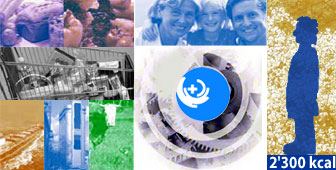Swiss take wider view of food supply

Switzerland is turning away from the siege mentality which has dominated its policy on food supply in times of crisis, according to experts.
Isolated in the heart of Europe and believing itself surrounded by hostile neighbours in the wake of the Second World War, the Swiss authorities implemented a plan to cultivate crops on most of the available land.
Older Swiss remember potatoes being planted in the centre of larger towns and cities such as Zurich. It was only after the fall of the Berlin Wall that there was a real change in thinking.
Switzerland now no longer believes in total self-sufficiency, the head of the Federal Office of Economic Supply (NES), Kurt Streiff, told a news conference on Thursday.
But at the same time, the Swiss authorities restated their commitment to fighting a potential food supply crisis.
Streiff said the NES remains prepared to face a crisis, most probably brought on by a natural disaster. Epidemics, computer piracy and economic sanctions are also considered potential threats along with war.
The Office has revised its thinking and also the numbers it uses to decide on stocks needed in a crisis. The Swiss apparently don’t need as much to eat as previously thought, consuming the equivalent of 2,300 calories per day, rather than the earlier estimate of 3,300.
Officials also believe the duration of a crisis would be shorter. Stocks are currently expected to last six months, although the authorities say they are prepared to guarantee supply beyond that time. As of 2003, foodstuffs for only up to four months will be stored.
Switzerland can cover two-thirds of its nutritional needs, but one-third of its food is imported. Because of this situation, the authorities have begun cooperating with other European countries to ensure supply.
The authorities are also prepared to help other nations deal with food crises. “We are also prepared to share our know-how with developing countries,” Manfred Bötsch of the NES told swissinfo.
Swiss agriculture, however, is still needed. Farmers are encouraged to be competitive to guarantee their survival in a global marketplace. And so far, overall crop and animal production has not dropped despite the disappearance of a number of farms.
Switzerland has not faced a food supply crisis since 1945. Events such as the Chernobyl nuclear accident, the spread of mad cow disease or the Gulf war raised Swiss fears, but the NES has never had to intervene.
In 1991, many consumers stocked up fearing repercussions from the Gulf war. The NES says such irrational behaviour has to be taken into account when managing supply.
In the event of a real crisis, rationing cards could be distributed if necessary to guarantee everyone a fair share of restricted goods. “The police and the army could also be called upon if needed,” said Bötsch.
Crisis management has also been upgraded by the NES, which employs 35 people with a budget of SFr5 million ($3million). A new software tool has also been introduced to help with decision-making on food supply.
Compulsory reserves in Switzerland are made up of flour, rice, sugar, coffee and cooking oil. The reserves are maintained by the government and traders.
by Scott Capper

In compliance with the JTI standards
More: SWI swissinfo.ch certified by the Journalism Trust Initiative
You can find an overview of ongoing debates with our journalists here. Please join us!
If you want to start a conversation about a topic raised in this article or want to report factual errors, email us at english@swissinfo.ch.